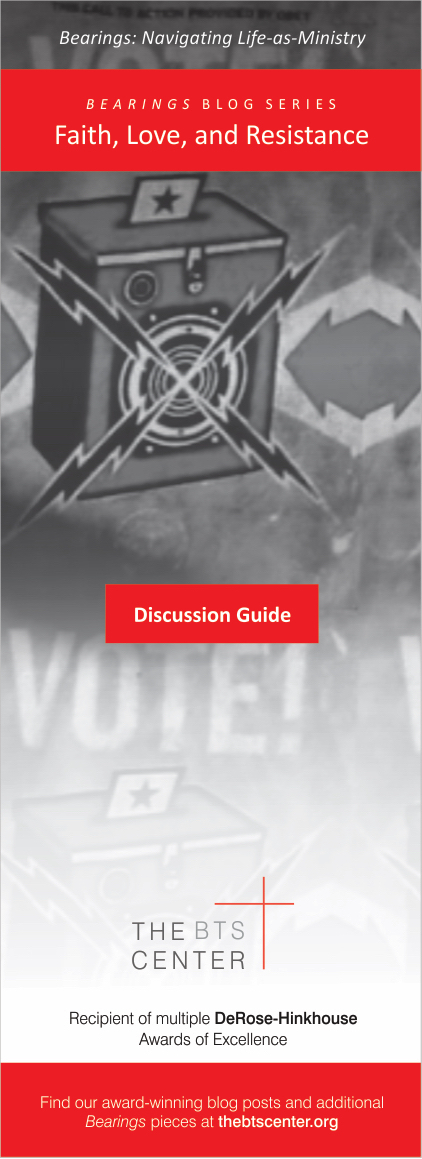Faith, Love, and Resistance
 The “Faith, Love, and Resistance” series, which ran between October and December 2016, examined contemporary political issues, debates, and dialogues through an explicitly religious lens. It sought to help progressive Christians boldly claim their faith tradition and embody its values of justice and compassion—not only in their interpersonal relationships, but also through political engagement in the public sphere. By emphasizing the important roles that people of faith and religious organizations can play in resisting structural and personal injustice, the “Faith, Love, and Resistance” series encouraged readers to integrate their mutual calls to religious conviction and political activism.
The “Faith, Love, and Resistance” series, which ran between October and December 2016, examined contemporary political issues, debates, and dialogues through an explicitly religious lens. It sought to help progressive Christians boldly claim their faith tradition and embody its values of justice and compassion—not only in their interpersonal relationships, but also through political engagement in the public sphere. By emphasizing the important roles that people of faith and religious organizations can play in resisting structural and personal injustice, the “Faith, Love, and Resistance” series encouraged readers to integrate their mutual calls to religious conviction and political activism.
The BTS Center’s blog, Bearings: Navigating Life-as-Ministry, won a 2017 DeRose-Hinkhouse Memorial Award of Excellence1for its series “Faith, Love, and Resistance: Progressive Christian Political Engagement Before and After the 2016 Election,” which ran between October and December 2016.
About the Series
“Faith, Love, and Resistance” examined contemporary political issues, debates, and dialogues through an explicitly religious lens. It sought to help progressive Christians boldly claim their faith tradition and embody its values of justice and compassion—not only in their interpersonal relationships, but also through political engagement in the public sphere. By emphasizing the important roles that people of faith and religious organizations can play in resisting structural and personal injustice, the “Faith, Love, and Resistance” series encouraged readers to integrate their mutual calls to religious conviction and political activism.
The series consisted of seven pieces, posted here in chronological order:
- “Re-seeing Evangelical Support for Donald J. Trump,” by Danny Cortez
- “Beyond Prophetic Rhetoric: Jesus and Justice in Practice,” by Jamye Wooton
- “What the Parrots of Telegraph Hill and Other ‘Invasive Species’ Can Teach the Church,” by Janet Dorman
- “Bearing Each Other Up: Reflections Upon the 2016 Election,” by Bearings Editors and Contributors
- “Yes, Jesus Loves Us. Now What?” by Mihee Kim-Kort
- “The Pain of ‘Doing No Harm,’” by Jordan Shaw
- “Hope is a Thing with Muscles,” by Elizabeth Drescher
Commentary and Reflection Questions
By Pamela Shellberg
One thing illuminated by this series is the instability of our perspectives in the realms of religious and political discourse, how seamlessly we shift between individuals and groups, between persons and systems as our units of analyses and scale—not only when we are thinking about others, but also when we think about ourselves. These shifts and slippages may contribute to our compartmentalization: often we are individuals thinking about single persons when in the religious realm; often we are a collective and perceiving groups and systems when in the political realm. Sometimes the particular demonstrates the universal, but sometimes the example is the exception to the rule.
As you read each blog post in “Faith, Love, and Resistance,” pay attention to your perspective as you read it. Do you receive it as if it was directed to you as an individual, as guidance for you as one person? Or do you read as if it was directed to a community of which you might be a representative?
Can you consciously shift your perspective? That is, can you read it as if it is written to “you,” singular? And then reread it as if it is written to “you,” plural? How do the questions and challenges of the piece change when you make the shift?
Where/How does the post’s author, in particular, challenge you (in the singular and in the plural) to integrate your mutual calls to religious conviction and political activism?
What do you think is the most compelling or challenging point the author makes in the post? To what statements are you resistant?
About the Award
1The Religion Communicators Council(RCC) is a national interfaith association of religion communicators at work in print and electronic communication, marketing, and public relations. Through its DeRose-Hinkhouse Memorial Awards program, the RCC “recognizes the achievements of RCC members who demonstrate excellence as religion communicators.”

